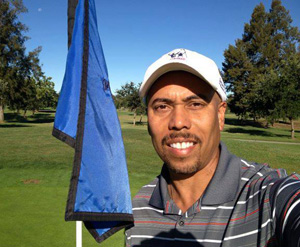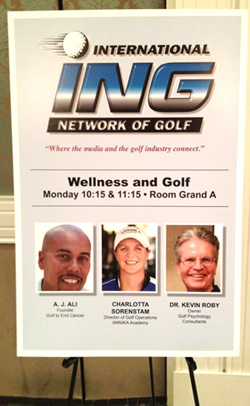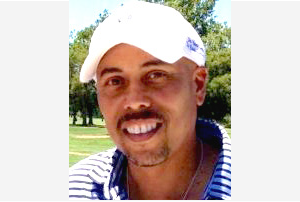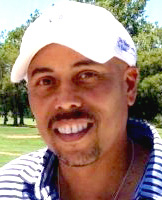I was in a familiar role as the only Black man attending the International Network of Golf Conference in Orlando, Florida on May 22nd when, thousands of miles across the pond, Sergio Garcia made his ill-fated remarks about inviting Tiger Woods over for fried chicken.
 In one glaringly misguided moment, Sergio tethered himself (and by default, his most visible sponsor TaylorMade-adidas Golf) to a legacy of racism that is sadly interwoven into the fabric of golf alongside elitism and sexism. Now, the question begs, what are Sergio and his sponsors going to do about it?
In one glaringly misguided moment, Sergio tethered himself (and by default, his most visible sponsor TaylorMade-adidas Golf) to a legacy of racism that is sadly interwoven into the fabric of golf alongside elitism and sexism. Now, the question begs, what are Sergio and his sponsors going to do about it?
I love golf and the mystical way that it is connected on the deepest levels to integrity, grace, sportsmanship, relationship and other things we hold dear. So when things come to light like Sergio’s remarks, it is a deeply painful reminder that for all of the potential that golf has to bring us all together, it has failed miserably and is showing no signs of embracing the diversity that the game invites to itself. No other sport has the potential to be as inclusive, and yet no other sport has gone to such tremendous lengths in its history to keep races, classes and sexes apart.

For years, golf has struggled financially. There are numerous reasons, the least of which being “the economy.” Reality is brought forth from the heart. In other words, you will draw to yourself those things which you hold dear. The heart of golf, meaning the people at its core long ago who determined its ill-fated reality, wanted it to be exclusive, elite and hard to obtain. Private clubs with no Black or women golfers, well, those were the pinnacle of golf’s elite establishments. Augusta was by far the most celebrated of those shrines, but there are others, like Burning Tree in the shadows of our nation’s capitol, that cling to traditions of separatism.
I was told a story of a member at Burning Tree who asked his wife to pick him up. She had to wait outside of the gates for him to leave the property. Women weren’t welcome. A quick glance at the photos of the Board of Directors on the walls of many private clubhouse walls looks like a collection of plates of weathered antique fine china.
Over a period of time in America, golf courses were made increasingly harder and more expensive to play, and the PGA’s minority program consisted of one person with virtually no budget. So when Fuzzy Zoeller made his fried chicken and collard greens comments about Tiger’s dinner choice at the 1997 Masters at Augusta, we were all appalled, but not surprised. Fuzzy, by all accounts a good man, has not lived that statement down. It has become part of his legacy. He is inseparable from that moment. It hangs around his neck like a badge of shame, and he has felt its weight through the years.
Nevertheless, with all of the consternation that moment caused more than 15 years ago, virtually nothing has changed. In fact, there are fewer African American men on tour today than there were then! There are virtually no African Americans in senior leadership in golf companies in America and an effort to create a long-overdue Black golfer’s exhibit in the World Golf Hall of Fame is stuck in neutral because funding is nowhere to be found from the industry that is by all accounts the most charitable industry in sports. That last fact seems particularly strange to me, considering that the PGA Tour and its sponsors are celebrating nearing the $2 billion mark in charitable donations.
So, when Sergio made his stabbing remark, cloaked in a joke, and the mood in the room quickly changed from jovial to nervous, golf was again reminded of its heart. And there I was several thousands of miles away at Reunion Resort, seeing the report on the Golf Channel, and that familiar “punched right in the gut, again” ache appearing in my stomach. At first I was incredulous. No, he did not go “there!” Then I was deeply saddened, for while I was at the conference to be “the wellness guy,” I was reminded again, that I was, in the minds of some in the golf industry, “the Black guy.” As in, the only one in a conference heralded as the International Network of Golf, featuring some 200 people.
If the business of golf looked like the population, I would see 20 other faces that looked like mine. Instead, I saw only the PR person for the Reunion resort, and probably only saw her because the resort is owned by a Black woman.
 It took everything I had to prepare to leave that hotel room that morning, to prepare to go down to the conference ballroom and carry on like it was business as usual.
It took everything I had to prepare to leave that hotel room that morning, to prepare to go down to the conference ballroom and carry on like it was business as usual.
I felt marginalized, like I had gone back in time and tried to enter a restaurant only to see a sign saying “Whites Only.” I even questioned why I tried so hard to fit into a business that on more than one occasion made it clear to me that I was not totally welcome.
But then, a memory. It was 1991 when Gary Player was opening the River Run course in Ocean City, Maryland. I was working for Tee Time Golf Magazine at the time and I was excited to meet one of my sports heroes. I attended the grand opening celebration and Mr. Player walked over to me, in a room filled with white faces except for mine, and greeted me with a warm smile and some sage advice. He wasn’t merely speaking with me, he was mentoring me, and it was heartfelt. He said the game is a wonderful game and while I will meet plenty of people who will not want me around because of the color of my skin, to stick with it because in the end the game will reward me. That was a special moment in my life, and I’ve had to draw on that memory and advice far too many times than I care to share.
Yes, I’ve walked into a private club only to be told that deliveries are to be made around back. Yes, I’ve actually heard the words “you didn’t sound Black on the phone” after meeting a golf pro in person to follow up on a call. Yes, I’ve actually had a guy toss me his car keys while standing at the entrance of a private club waiting on my playing partners to arrive. It was a pretty nice car. I should have accepted the keys as a gift and driven off with it.
So when Sergio Garcia was asked about Tiger and he said “We will have him around every night. We will serve fried chicken,” I had to draw deep down on that memory of Gary Player’s advice. Yet again, the memory of his words gave me the strength to walk into a room as “the Black guy.” As I shared my feelings openly with my roommate, Bill Conwell, a white, older executive of the very progressive and wonderfully diverse Back 9 Network, he went further to ease my pain. We talked openly about race and golf’s uneasy relationship with it. We talked about solutions. We agreed that we would continue to do what we always did together, which was to ignore the idiots, embrace the heroes and continue to press for change.
Bill is an amazing friend and a great ambassador of the game. Knowing him is one example of Mr. Player’s words coming true, that the game would reward me.
Fuzzy was age 45 in 1997 and on the tail end of his career when he made his unfortunate comments about Tiger Woods. He paid a price, literally, when sponsors turned their backs on him. Reality is brought forth from the heart.
Sergio Garcia’s comments weren’t funny. They were racist, hurtful and extremely disappointing. Sponsors should take note that Fuzzy hasn’t fully recovered from his remarks, and neither will Sergio, who is at a much younger point in his career than Fuzzy was at the time of his gaffe.
There’s a lot more that Sergio and his sponsors stand to lose over time if a segment of the golf equipment buying public feels alienated and unwelcome. Practically speaking, tens of millions of dollars in sales could be quietly lost, unless, something is done to reshape his legacy.
The NBA’s Carmelo Anthony went through a very nasty period when he appeared in an amateur video filmed by his childhood friends who were into less than noble pursuits. An “I’m sorry” by Melo wasn’t enough for his critics. When I was brought in to help with damage control, the exercise included orchestrating dialogue with a congressman and holding a press conference with the governor, a trauma surgeon, ministers and others to denounce youth violence.
Melo spent numerous hours in the community making good on a promise to be a good example for young people. His main sponsor, Nike, wrote a substantial check to have Carmelo’s name placed on a refurbished community center. A very expensive lesson was learned, and his legacy was repaired.
In golf, it is widely reported by news outlets such as the New York Times that John Daly’s sponsor Callaway paid for him to go into rehab and also paid off his gambling debts years ago. However, he couldn’t hold up his end of the bargain to stay sober and he was dropped. That failure cost him millions of dollars, and his lifestyle almost cost him his life. To John’s credit, he has learned some valuable lessons, albeit the hard way, and has been on a long road to recovery for a few years now. I’ve had some personal time with John and he has one of the biggest hearts I’ve ever seen in a man. I’ve often said that if he was as good to himself as he is to so many other people, he would become one of golf’s true champions.
Sergio and his sponsors have some major damage control to tend to because his legacy, to many, has been tarnished. It’s a shame that one remark can taint a man’s legacy, but that’s the unfortunate result of living in the age of the Twitterverse. It would be easier to clean blood off a white linen shirt than to erase the sound of his remarks about having Tiger over for fried chicken, but it can be done.
Golf Journalist Pete McDaniel said about Sergio’s statement, “It is the perpetuation of a negative stereotype.” Pete is also a dear friend, the author of the seminal work about Black golfers in America, “Uneven Lies,” and the driving force behind creating the Black golfer’s exhibit in the World Golf Hall of Fame, to tell the in-depth story of the legacy of Blacks in the game we all love.
I’ve never met Sergio. I’m sure he’s a nice guy. He’s got a great smile, he seems to have fun on the golf course and aside from his feud with Tiger, I’m sure he’s generally well-liked on Tour. So, I’m going to give Sergio a mulligan. I love golf, and I’m not going to let his remarks spoil my walk in the park. Along with the mulligan, I will offer Sergio some advice. Whether he takes it or not, is up to him.
Sergio, I’m sure you understand how hurtful your comments were to millions of people who feel marginalized. You’ve apologized, but I encourage you to go the extra mile. Get together with your sponsors and pledge your winnings from this week’s U.S. Open to go towards funding the Black golfer’s exhibit at the World Golf Hall of Fame. What an amazing gesture that would be. Sit down with Pete McDaniel, Mr. Player, Tiger Woods, myself, and others to have an open and meaningful discussion about race in America and race in golf and pledge to do something about it. With your charisma and love for the game, you’re in a great position to make a tremendously positive difference in the game we all love, and in a world that needs more celebration of diversity.
In other words, put your time and your money where your mouth is. Make amends in a way that will help to break down the barriers that have held our beautiful game back from its full potential. You have an opportunity to reshape your legacy with one bold move by helping golf to celebrate diversity. And I know you know a thing or two about bold moves. I’ve seen you play. You’re a risk taker. You shanked one. Here’s a mulligan. It’s up to you whether you use it.
Talk to you again, soon.
A.J. Ali
Writer, Producer & TV Host
Malibu, California
Affiliations include: Marathon of Miracles, Golf To End Cancer and Wellness For Golfers
 Send A.J. an Email Message!
Send A.J. an Email Message!
AjAliWins@gmail.com


